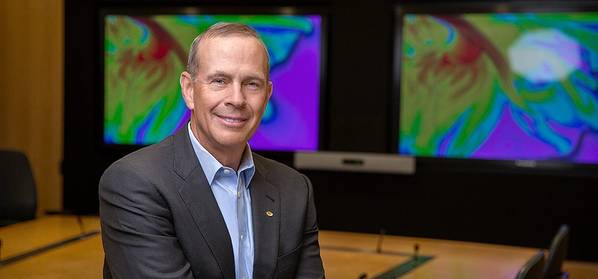
Chevron CEO Michael Wirth is facing a showdown with Exxon Mobil over his $53 billion bid for Hess and its stake in Guyana's oil hotspot, and could end up locked in a dispute between two of the country's biggest energy rivals. South America.
On Wednesday, Exxon filed an arbitration claim that could block Hess' proposed merger with Chevron. The sale includes Hess' 30% stake in a consortium that discovered more than 11 billion barrels of oil in Guyana's Stabroek offshore block, which analysts say has a recoverable oil potential of more than 20 billion barrels. .
Exxon, which holds a 45% stake in the consortium, with Hess and CNOOC holding minority stakes, claims that the operating agreement governing the group gives it the right of first refusal on any sale of Hess's petroleum assets in Guyana.
The fight for a share of the biggest oil discovery in nearly two decades could soon test Wirth's famously calm demeanor. But a deal would be a legacy for Wirth, who is known at the second-largest U.S. oil company as an affable but firm boss.
Wirth won praise on Wall Street for his refusal to get involved in a bidding war for Anadarko Petroleum in 2019, and then moved to boost Chevron's reserves through a series of small deals.
His ability to play the long game served him well in Venezuela, where he maintained the company's holdings in the country amid years of hyperinflation and punitive U.S. sanctions.
The 63-year-old executive declined to be interviewed.
A spokesperson, however, emphasized that the company remains “fully committed to the transaction and confident in our position. We look forward to closing the transaction.”
Two broken deals?
If Exxon's challenge blocks the Chevron purchase, it will be the second time a deal has slipped through Wirth's hands. His $33 billion bid for Anadarko, just a year after taking over as CEO of Chevron, was rejected by a higher offer from Occidental Petroleum.
“The truth is that Wirth was late to the party and a step behind on almost everything,” said Bill Smead, founder and chairman of Smead Capital Management, who said Wirth also missed an opportunity in 2022 to buy Occidental with the assets from Anadarko for US$32 billion, less than the 2019 offer.
“Because he made decisions like this, he is in a food fight for property in Guyana,” Smead said.
Wirth won a $1 billion termination fee on Anadarko's loss, but Exxon said this week it would consider exercising its right of first refusal if Chevron proceeds with its bid. If Chevron backs out of the deal, Hess could potentially be free of a $1.7 billion termination fee.
Exxon left open the prospect of a negotiated settlement.
Its arbitration claim before an international tribunal could take about six months or more to resolve, Exxon senior vice president Neil Chapman said, delaying Chevron's goal of closing the deal by mid-year.
Hess said Thursday it was reviewing the timeline for closing the deal.
Analysts said the dispute could go either way.
"It's still very possible" that Exxon will see the need to make a bid for Hess before a Chevron-Hess shareholder vote, which could happen in the coming months, said Mark Kelly, CEO of financial advisory firm MKP Advisors.
“Exxon has apparently hinted that it really wants to own the Hess stake in Guyana, so it potentially needs to put something competing on the table before a Chevron-Hess vote,” he said.
Paul Sankey, an analyst at Sankey Research, said the other possibility is that Chevron is forced to pay Exxon to allow the deal to proceed.
“There is a possibility that (Chevron) will give them a check and just say, 'Can you leave, please? And there is a possibility that they (Exxon) will resort to arbitration and delay the agreement,” he said.
Border tensions
Wirth's misfortunes accumulated throughout the world. Last autumn, it postponed for the second time a major expansion project at an oil field in Kazakhstan, where it is the operator and Exxon is a partner.
Later, Venezuelan President Nicolás Maduro revived a century-old border dispute with Guyana and threatened to take control of Guyana's oil fields by force.
“He (Wirth) has to remain super neutral and discreet” while the two countries resolve the dispute, said Francisco Monaldi, an expert on Latin American energy at Rice University's Baker Institute for Public Policy.
“It would make sense for Chevron to treat Guyana as an investment on which it makes no decisions,” he said. “It would be easier for the Venezuelan government not to have to recognize that Chevron would be on both sides” of the disputed border.
As the only major US oil company that has remained in Venezuela despite US sanctions on the OPEC country since 2019, Wirth faces a new challenge to its operations in Venezuela.
Chevron last month produced about 180,000 barrels a day from its joint ventures in Venezuela – production that could again be prevented from being delivered to its North American customers if sanctions are reimposed.
“Everyone says he (Wirth) is a good guy, he’s in the right business and he’s going to figure it out,” Smead said. “If not this deal, he’ll get the next one.”


















































